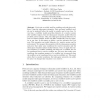Free Online Productivity Tools
i2Speak
i2Symbol
i2OCR
iTex2Img
iWeb2Print
iWeb2Shot
i2Type
iPdf2Split
iPdf2Merge
i2Bopomofo
i2Arabic
i2Style
i2Image
i2PDF
iLatex2Rtf
Sci2ools
117
click to vote
APN
2003
Springer
2003
Springer
Reactive Petri Nets for Workflow Modeling
Abstract. Petri nets are widely used for modeling and analyzing workflows. Using the token-game semantics, Petri net-based workflow models can be analyzed before the model is actually used at run time. At run time, a workflow model prescribes behavior of a reactive system (the workflow engine). But the token-game semantics models behavior of closed, active systems. Thus, the token-game semantics behavior of a Petri net-based workflow model will differ considerably from its behavior at run time. In this paper we define a reactive semantics for Petri nets. This semantics can model behavior of a reactive system and its environment. We compare this semantics with the token-game semantics and prove that under some conditions the reactive semantics and the token-game semantics induce similar behavior. Next, we apply the reactive semantics to workflow modeling and show how a workflow net can be transformed into a reactive workflow net. We prove that under some conditions the soundness propert...
Related Content
| Added | 23 Aug 2010 |
| Updated | 23 Aug 2010 |
| Type | Conference |
| Year | 2003 |
| Where | APN |
| Authors | Rik Eshuis, Juliane Dehnert |
Comments (0)

